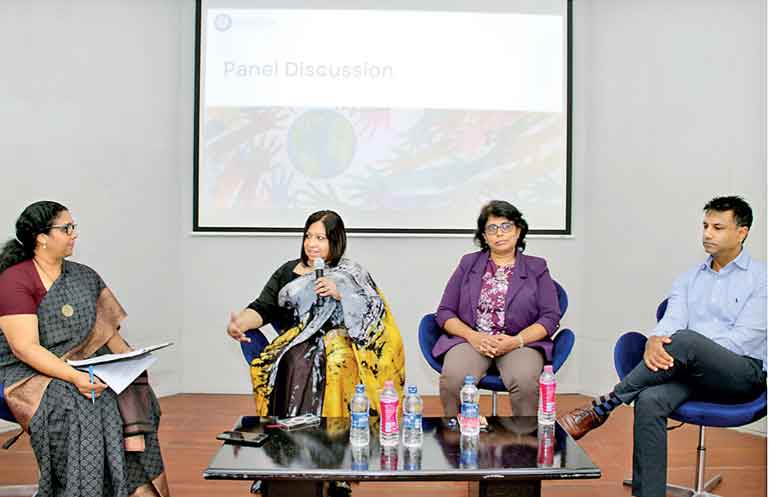Sunday Feb 22, 2026
Sunday Feb 22, 2026
Friday, 22 March 2024 00:32 - - {{hitsCtrl.values.hits}}

EFC Deputy Director General, ILO Country Director for Sri Lanka and Maldives and the panellist

Women’s labour force participation in Sri Lanka has been declining over time. ILO estimates that investing in policies and services to support workers with family responsibilities could generate a considerable number of jobs here at home, the bulk of which would go to women. These observations were made by the ILO Country Director for Sri Lanka and Maldives, Joni Simpson at a forum initiated by the Employers’ Federation of Ceylon (EFC) recently to mark the International Women’s Day.
Delivering her keynote address at the EFC event under the theme - ‘Inspire Inclusion to forge a more inclusive workplace for women’, ILO Country Director further noted that the EFC, is well placed to promote and introduce policies and initiatives to ensure inclusivity and gender equality in the workplace.
“The EFC views upholding equity, diversity and inclusion at the workplace as one of the priorities whilst recognizing the need for creating respectful workplaces free of discrimination for all employees. It is with this in mind that the EFC organized an event of this nature to create awareness among enterprises and to share best practices adopted by our members, for others to emulate same,” Deputy Director General, EFC, Adhil Khasim remarked.
The panel discussion which followed brought three leading corporate figures on board- Gayani de Alwis, Sandra de Zoysa and Isuru Gunasekera who shared best practices adopted by their respective companies in creating an inclusive workplace. The session was moderated by EFC’s Senior Industrial Relations Advisor, Sonali de Silva.
Vice Chairperson of Women’s Chamber of Industry and Commerce in Sri Lanka and Founding Chairperson and Advisor- WiLAT Sri Lanka, Gayani de Alwis, among her observations, elaborated on the need to capture and retain the skills of Sri Lankan women and upskill them in the already shrinking women work force and to be more vocal about opportunities available for women in non-traditional sectors.
De Alwis also made a case for changing social dynamics to which the workplace needs to be adapted. “Today migration is rampant and a lot of women need to juggle their careers while looking after ageing parents. Our policies and laws should be flexible to cater to these changing dynamics.” She also cited the need for better access to career guidance.
Group Chief Customer Officer- Dialog Axiata PLC and Director- Dialog Business Services, Sandra de Zoysa remarked that the potential for women in the digital world is enormous and the industry should be supportive of a younger generation whose expectations are different to generations before them. “We need to be constantly reminding ourselves of how we could support a gig economy and how we should cater to cross-discipline engagement which the young generation prefers.”
Noting that these are exciting times for women to be in the workforce, De Zoysa who is a pioneer woman in the country’s mobile industry noted that injecting creativity to the workplace and enabling flexible work arrangements for continuous education is vital. She also cited the recent conversations about wellness, particularly the mental health of women employees which is critical to forge not only a productive workforce but also a happy home.
Chief People Officer and Head of Group Sustainability, Enterprise Risk Management & Group Inititaives and Executive Vice President John Keells Holdings PLC, Isuru Gunasekera threw light on the best practices at his company which promote an inclusive workplace for women. He cited ‘gender clarity’, ‘shedding unconscious biases’, ‘mentoring programmes’ and ‘equal parenting’ as some of these good practices which other companies could emulate. Elaboraring on the equal parenting initiative which is considered a ‘game-changer’ which grants 100 days of maternity/paternity leave, Gunasekera remarked that it strives to champion the father’s role in child care which is often undermined.
All panelists drove home the message that reskilling the workforce to meet the emerging job demands is critical, so that the country will have the ‘right narration’ by 2030.